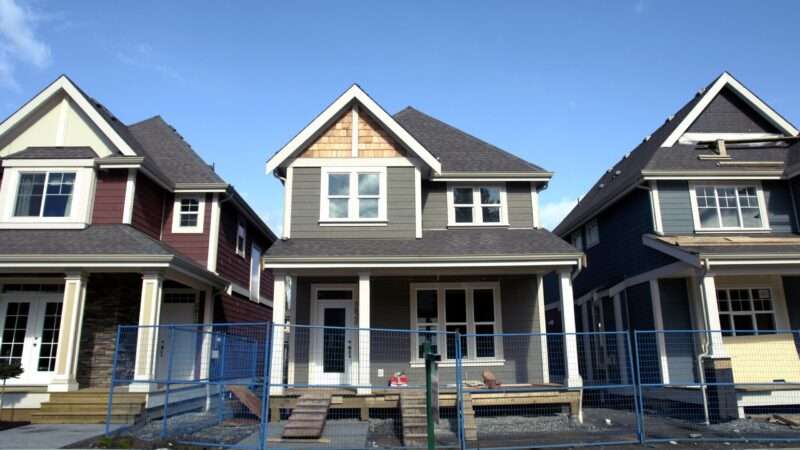
Here's a vicious cycle for you. Rising housing costs are contributing to inflation, prompting the Federal Reserve to hike interest rates. Those higher rates make mortgages more expensive, exacerbating the housing affordability crisis. Doubling down on measures that could deepen this dilemma is the worst thing the Biden administration can do to halt this cycle—but that is precisely what it's doing.
Home prices have risen 5.8 percent year over year, with many analysts predicting continued escalation. Yet the administration and key Democratic lawmakers want to implement the International Energy Conservation Code, which would require new homes to meet stricter energy efficiency standards, from more insulation to high-tech thermostats to more advanced HVAC systems, along with new testing and certification requirements.
States and cities have traditionally set building codes, but the federal government has been pushing these new standards, aided by $1 billion in Inflation Reduction Act grants for training and hiring code enforcers. Sen. Jeanne Shaheen (D–NH) and other legislators have gotten involved with the push, claiming that the new rules could significantly lower energy bills for homeowners and renters.
Some Republicans have pushed back. In North Carolina, the state House and Senate recently overrode Gov. Roy Cooper's veto and delayed implementation of any new energy code until 2031.
It is undeniable that energy efficiency codes inflate construction costs. According to a study by the National Association of Home Builders, the regulations would add between $3,000 and $12,000 to the cost of a typical home, depending on location and efficiency options chosen. The U.S. Department of Energy (DOE) offers more conservative estimates, ranging from $1,000 to $4,000 in added costs for single-family homes.
The codes' boosters claim that these expenses will be recouped through lower energy bills. But even the DOE concedes that some items in the new code could have long payback periods. According to the agency's own numbers, continuous wall insulation would cost up to $2,000 to install and would result in 2.7 to 3 percent energy savings for a reference house. That implies more than a 30-year payback period—and that's if you're paying cash. Most people finance their homes, and interest rates are high right now. At a 7.9 percent interest rate, that payback period extends to 90 years. With such long waits, a homeowner might prefer to opt out. But mandatory energy codes do not allow for such discretion.
Eight states currently mandate no energy code at all, and only Nevada and New Jersey have fully adopted the 2021 code statewide for residential construction. There's no need to mandate something if it truly makes financial sense. Builders already market energy-efficiency improvements, and many homeowners adopt them voluntarily, even exceeding code requirements.
Moreover, energy efficiency improvements are already a trend, even in states with minimal codes. Homes built since 2000, despite being on average 30 percent larger and equipped with more appliances than older homes, consume only 2 percent more energy and are significantly more efficient per square foot than homes built decades earlier. The energy code should be a voluntary guideline for what's possible for homeowners and businesses.
A new code is currently in development, and lobbyists for electrical appliance and plastics manufacturers are already lining up behind it. There's certainly a political logic for Democrats to help one of their special interests, but there's also a political risk. It's one thing to spend future generations' tax dollars; it's another to regulate current voters and would-be homeowners into higher costs.
According to the Federal Reserve Bank of New York's housing survey, both homeowners and renters are increasingly pessimistic about their chances of obtaining a mortgage or refinancing. Worse still, renters' self-assessed probability of ever owning a home fell to 40.1 percent, the lowest result since the survey began in 2014.
The federal government could do many things to lower housing costs, from cutting tariffs on supplies to ending subsidies that push up prices. Focusing on those options would be both politically wise and better policy rather than imposing new regulations that make the situation worse.
The post We Don't Need a Nationwide Energy Code appeared first on Reason.com.







